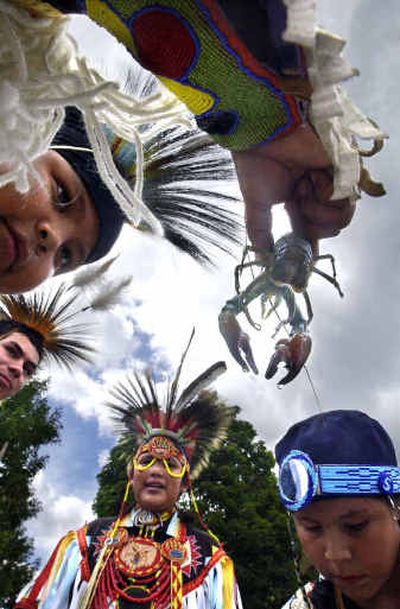Organizer re-energizes powwow

Chepa Knowshisgun was as calm as still water.
It was the second of three days of the Spokane Falls Northwest Indian Encampment and Pow Wow, and the event seemed to be running itself. Credit the Rolex-like precision to Knowshisgun, a 25-year-old Native American, who took over as chairwoman this year.
It’s not that Knowshisgun and her powwow partner, Bonnie Joseph, saved the annual event. But they did put it back on track – and back to the Lilac Bowl in Riverfront Park.
“Last year, it was a flop,” said Sonny Quinto, an announcer at the powwow and father of Knowshisgun’s two children and the one on the way. “For one thing, it was moved over by the clock tower because of a summer concert series.”
“It needs to be by the river,” said Quinto, noting that generations of Native Americans came to the river to gather salmon. “This is a way to honor our ancestors.”
Knowshisgun and her committee worked with the city and other decision-makers to move the 15th annual powwow back to the banks of the Spokane River. Now, all Knowshisgun can do is kick back and enjoy the spectacle of native dancers from throughout the Northwest.
“If you caught me yesterday (Friday), I wasn’t like this” a calm Knowshisgun said Saturday afternoon. “We ironed out a lot of the kinks. Everyone knows what they’re doing.”
In this case, “everyone” is 84 tribes and the 43 Native American vendors selling arts, crafts and food, or offering information. Aside from giving the patrons a chance to indulge in some sinfully delicious fry bread, the event also allows people to watch specific tribes compete in dance. Several intertribal dances also are scheduled throughout the program. Today’s grand entry begins at 1 p.m. Powwow winners will be announced at approximately 4:30 p.m.
For some, the powwow is a chance to dance to the drumbeat that fills the park, strutting in their colorful regalia. For others, it’s an educational tool.
For instance, spectators are told that if an eagle feather falls from a dancer’s costume, the action will stop. A war veteran must retrieve the feather for the dancer.
“When this happens, out of respect, the (powwow) committee asks that no photos or video footage be taken of this ceremony,” reads the event program.
Participants range from “tiny tots” to “golden age,” all in traditional dress with such natural materials as buckskin, feathers, and porcupine hair and quills. The dances have such names as Prairie Chicken-Round Bustle, Crow Hop and Happy Dance.
For Beth Jacobs of Spokane, the powwow seemed a perfect place to take her son, two nieces and two nephews on Saturday.
“There’s so much more than what people think … all the dancing and the music. It’s beautiful,” said Jacobs’ niece, Melissa Hall, an eighth-grader at Centennial Middle School in Spokane Valley.
Added Hall’s sister, Sarah Hall, a fifth-grader at Orchard Center, “I thought Indians were just about bows and arrows.”
Knowshisgun, part Northern Cherokee and part Oglala Sioux, is doing her best to dispel such stereotypes.
She met Joseph in a “Temporary Assistance for Needy Families” class where participants were encouraged to go beyond their comfort zones. So, the women began volunteering, representing Natives Devoted to Natives, a support group for families living in poverty.
“We wanted to break barriers for ourselves and for our people,” Knowshisgun said.
Now, Knowshisgun is earning praise from people like former Spokane Mayor Sheri Barnard, who was instrumental in the first powwow.
“Last year, it was in trouble,” said Barnard, “But this young woman, she and Bonnie Joseph have been phenomenal.”
Knowshisgun, meanwhile, likes to remember back to her first powwow experience, six years ago when she moved here from Salem, Ore.
“I’d come at night and watch,” she said. “It never even crossed my mind that I would be one of the main people in charge of making this whole thing happen.”